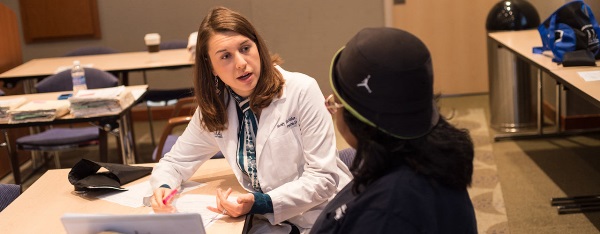Pharmacy professor takes a more active role in patient care thanks to new Ohio law

Dr. Melody Hartzler teaches by example thanks to HB 188 law.
The pharmacist's role has changed during the past decade. Once known for dispensing prescriptions and warning doctors of potentially dangerous drug interactions, today’s pharmacists now have the ability in certain situations to prescribe medicines and order labs.
Welcome to the new reality of 21st century American medicine. And the Cedarville University School of Pharmacy is training future pharmacists by example.
Melody Hartzler, Pharm.D., associate professor of pharmacy practice, is taking advantage of a new law that expands opportunities for pharmacists in private practice patient care. Ohio House Bill 188, passed in December 2015, opened the door for pharmacists and physicians to enter consult agreements allowing pharmacists to prescribe medicines and order labs.
In addition to her duties at Cedarville, Hartzler is an in-house pharmacist at Western Medicine Family Physicians in Fairborn and Enon, Ohio. Cedarville school of pharmacy Doctor of Pharmacy students have the option of rotating through Hartzler’s office to fulfill clinical requirements. She hosts students once a month throughout the calendar year.
Hartzler’s main focus is managing the office’s high risk diabetes patients. However, she also manages chronic conditions such as hypertension, asthma and COPD. “I’m engaged in direct patient care,” she said. “I modify existing drug therapy, prescribe new medicines and address core lifestyle and diet modifications for treatment of chronic disease.”
Western Medicine physicians refer patients to Hartzler, then patients schedule an appointment. She completes a medical history related to their diabetes or other condition, collects diet and exercise information and takes an inventory of patient medications and records their outcomes. She also performs an extensive review of systems and often performs a physical exam tailored to the patient’s condition (i.e., diabetic foot exams).
She also provides in-depth education to patients about appropriate eating habits and exercise.
This past July, Christian Aric Carroll, a 2018 Doctor of Pharmacy candidate, completed a clinical rotation with Hartzler.
“It was really amazing to see how a pharmacist can be so deeply involved in a patient’s care and truly function as a mid-level practitioner,” said Carroll. “Dr. Hartzler orders labs, provides prescriptions for medications within her scope of practice, sets up referrals to other specialists such as podiatrists and much more.
“During my time at Western Medicine, multiple providers described how much they valued referring patients to Dr. Hartzler, knowing their patients would be cared for appropriately,” Carroll added.
“There have been hundreds of pharmacists operating under a collaborative practice model since the 1970s,” explained Marc Sweeney, dean of the school of pharmacy. “It was more common in hospitals and other in-patient settings in the 70s and 80s, but began expanding to outpatient clinics in the mid-90s.”
According to Hartzler, the expanding collaboration between pharmacists and physicians was highlighted at a recent comprehensive care meeting she attended. “During one session, a physician stood up and told the audience why they should hire a pharmacist in their practice to achieve their clinical outcome goals for the program,” she said. “These are exciting times for pharmacists.”
Located in southwest Ohio, Cedarville University is an accredited, Christ-centered, Baptist institution with an enrollment of 3,760 undergraduate, graduate, and online students in more than 100 areas of study. Founded in 1887, Cedarville is recognized nationally for its authentic Christian community, rigorous academic programs, strong graduation and retention rates, accredited professional and health science offerings, and leading student satisfaction ratings. For more information about the University, visit www.cedarville.edu.